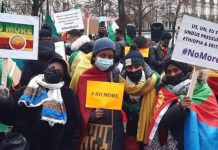Africa-Press Ethiopia
Stranded in Tijuana, a group of asylum seekers from Cameroon, Uganda and Ethiopia banded together in a shared hotel room. There, they would wait out Trump administration policies that had blocked their ability to request protection in the United States amid the pandemic.
The group has been harassed, threatened and extorted by Mexican officials since their arrival in the border city, an Ethiopian man told human rights researchers.
“The conditions are very horrible,” the man said of the hotel. “We have to buy everything like bed sheets and everything that we need. They give us these rotten mattresses. There are a lot [of] bugs and animals.”
Then, in November, a new hotel owner kicked the group out onto the streets, saying that he doesn’t like Africans, the asylum seeker said.
The group is among many thousands of asylum seekers stuck in Tijuana and along the U.S.-Mexico border who are struggling to survive as their temporary housing options whither and orders blocking their entry to the United States stretch out indefinitely.
Their plight is just one of the examples laid out in a report published by Human Rights First in December that looked at the ways asylum seekers have been increasingly harmed by U.S. immigration policies in 2020, especially those put into place following the arrival of the pandemic.
“This is both a humanitarian disgrace and a legal travesty,” the report says of a series of Trump administration orders.
The group of asylum seekers from African countries, like many others along the U.S.-Mexico border, had been waiting before the pandemic for their numbers to be called on wait lists that have become the de facto process for migrants to request asylum at ports of entry. The policy, known as “metering,” restricted how many asylum seekers ports of entry would process on a given day.
When the pandemic hit, ports of entry stopped processing asylum seekers altogether.
Then the Trump administration issued an order through the Centers for Disease Control and Prevention to keep asylum seekers who cross into the United States illegally — the only other option when ports of entry are closed — from even taking the beginning steps in the long process of requesting protection in the U.S. asylum system.
Under the order, border officials turn back many asylum seekers to the country they were most recently in — generally Mexico. Officials also detain asylum seekers and then put them on planes back to the countries that they fled.
Sending asylum seekers back to their home countries without screening them to see if they qualify for asylum goes against a key part of international agreements about the treatment of refugees.






